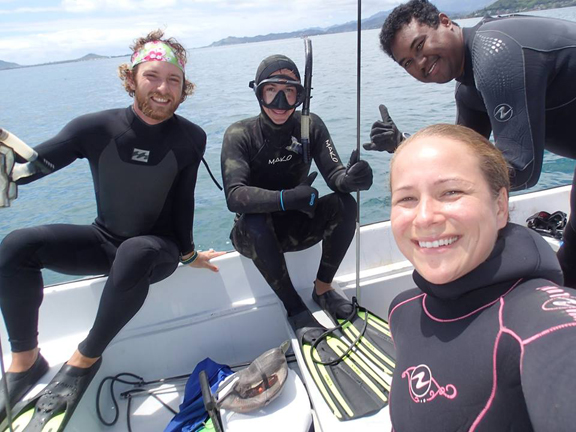Research Projects 2016-2018
Fish Flow: Filling the gap between spawning and settlement
PRINCIPAL INVESTIGATOR: Brian Bowen
Co-INVESTIGATOR: Stephan Karl
Graduate Fellow: Derek Kraft

The proposed research will track fish from egg production to the reefs where they settle and enter local fisheries on Oʻahu and adjacent islands. To promote sustainable use of coastal marine resources, we are asking where do fish come from, and where are they going? We will accomplish this task with advanced genetic technology available at the Hawai‘i Institute of Marine Biology (HIMB), linking new generations of fishes to the adults who produced them. Based on species of concern identified by community members and state agencies, we selected five species for efforts to link spawning to adult habitat: Weke‘ā (Squarespot Goatfish, Mulloidichthys flavolineatus), Manini (Convict Tang, Acanthurus triostegus), Kole (Goldring Surgeonfish, Ctenochaetus strigosus), ‘Ama‘ama (Mullet, Mugil cephalus), and ‘Omilu (Bluefin Trevally, Caranx melampygus). This information is an essential foundation for implementing ahupua‘a (traditional Hawaiian socio-economic subdivisions) management of land and sea districts. For example, if we demonstrate that reef fishes complete their entire life cycle within semi-enclosed Kāne‘ohe Bay, this would align with the ahupua‘a approach to coastal resources. Our results will directly benefit fisheries by identifying critical areas for fish production and recruitment. Local fishermen will gain information about areas vulnerable to fishing pressure. Ultimately, this research will help ensure that our living resources remain sustainable by illuminating the sources of successful fish production. The benefits are straightforward: the Hawaiian economy is the environment. Healthy reef ecosystems translate into healthy water resources, cultural integrity, sustainable coastal development, and tourism.
Watch a podcast on this project here.

